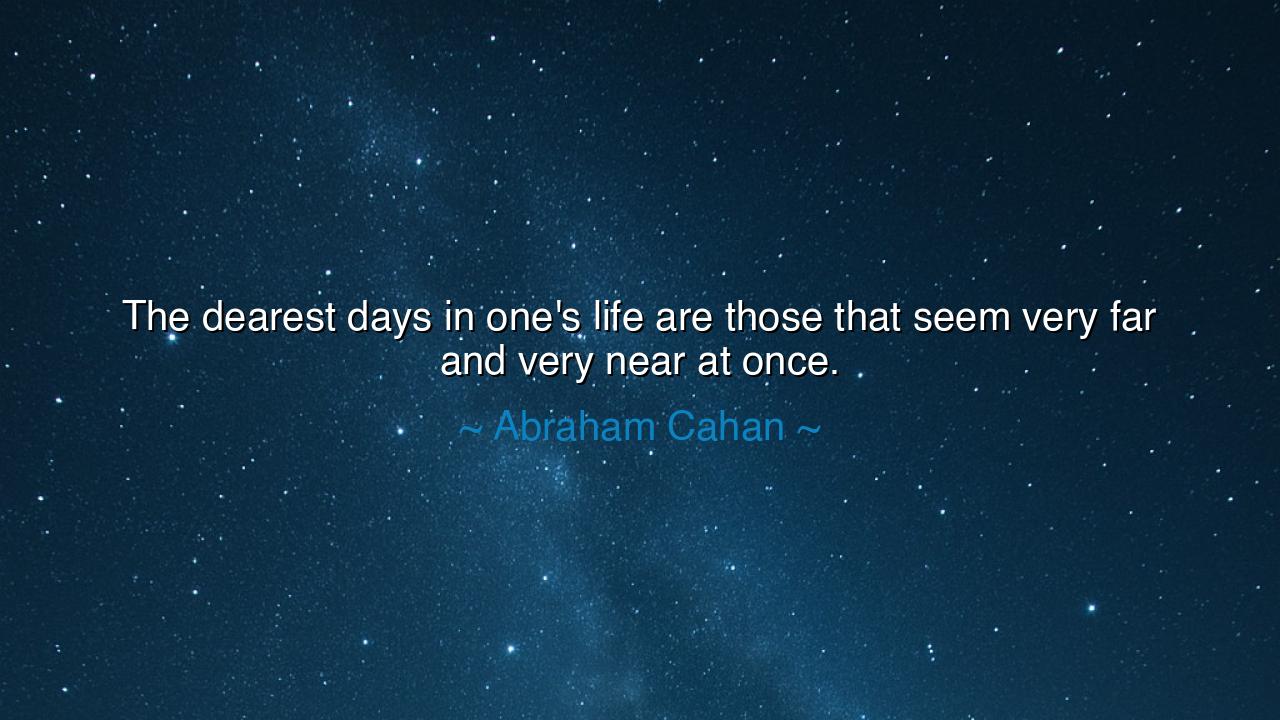
The dearest days in one's life are those that seem very far and






"The dearest days in one's life are those that seem very far and very near at once." – Abraham Cahan.
In these words, Abraham Cahan speaks to the profound paradox of memory and time. There are moments in life, those cherished memories, that seem to exist in the realm of both past and present. They feel as though they happened just yesterday, yet at the same time, they seem like they belong to an age long past, separated by the endless stretch of time. These are the moments that, despite the passage of time, continue to shape and mold the soul, lingering in our hearts with a sense of nostalgia and longing.
The ancient philosophers often spoke of the fluidity of time. Heraclitus famously stated that "you cannot step into the same river twice," emphasizing the ever-changing nature of existence. Yet, the wisdom in Cahan’s words lies in the recognition that while the river flows forward, there are times when it feels as though we are standing still, caught in the eddy of our most precious memories. These memories—these dearest days—are the moments when time seems both eternal and fleeting. In those moments, we find the fullness of life, as they contain the power to pull us back into the past while simultaneously anchoring us in the present.
Consider the life of the great poet Rainer Maria Rilke, who, in his reflections on life and time, expressed a similar sentiment in his writing. Rilke spoke of the inevitable passage of time, yet he also understood the timelessness of memory. One can recall a childhood summer, a long-lost love, or a fleeting moment of triumph, and in an instant, it feels as though that day could return at any moment. Yet, when we step back and reflect, we realize how far those days are, how much time has passed since we stood in that very place. But the dearest days remain, not simply as memories, but as living moments that shape our present reality.
Perhaps, in our own lives, we can recall a time of great joy or sorrow—a moment in our youth when the world seemed so full of possibility, or a period of personal growth that altered our path. In those moments, there was a sense that we could never forget, that time itself had etched those experiences deeply into our being. But with the passage of years, we come to realize that those moments have faded in some ways, becoming part of the distant past. Yet, they remain deeply alive within us, as vibrant and clear as if they occurred just moments ago.
The great philosophers of ancient Greece also meditated on this tension between the past and present. Plato in his dialogues spoke of how the soul holds onto the eternal forms, even as the body moves through time. The memories of our most cherished moments are like these eternal forms—they never truly fade, but instead exist in a realm where time’s hold upon them is loosened. They feel as though they are always with us, present in the deepest recesses of our minds, even though they belong to a distant past.
The lesson that Cahan imparts is clear: our most beloved memories are not confined to the past; they exist in a timeless space, ever-present and yet distant. It is the nature of life that these days—though far gone—continue to live within us. We must honor these days, for they remind us of who we were, who we are, and who we hope to become. These cherished moments are the bedrock upon which we build our present selves.
In our daily lives, we must not lose sight of the significance of these moments. Whether it is a moment of love, a moment of great personal achievement, or a simple moment of joy, these are the days that shape us. Let us hold them close, not merely as memories of the past, but as guiding lights that inform the choices we make today. Live fully in the present, and do not let time slip by without savoring those moments that matter most. For those are the moments that, once gone, will seem both very far and very near at once, forever imprinted on the soul.






AAdministratorAdministrator
Welcome, honored guests. Please leave a comment, we will respond soon